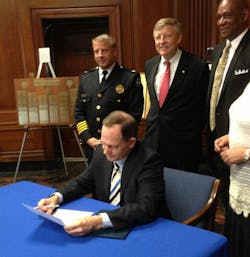St. Louis Regains Control of Police Department
St. Louis has regained control of its police department from the state after Mayor Francis Slay signed an executive order Saturday he said was "too long in coming."
The state board of police commissioners gathered for the final time in a mostly ceremonial meeting at police headquarters that ended 152 years of oversight. Current and former board members at the meeting and the reception that followed were thanked for their service.
The change is bittersweet, said Chief Sam Dotson, because of the end of a long history of police officers swearing an oath before the police board. Dotson said his team is ready for the transition and city residents can expect no changes in patrols or staffing.
The city will absorb several of the police department's divisions including human resources, purchasing and fleet management. Slay, who was one of five members of the board, said the streamlining will make the department more effective and efficient.
"Local control will make our city better and safer for generations to come," the mayor said in his remarks at the meeting.
The state gained control over the metropolitan police department in 1861 in a move aimed at thwarting Union sympathizers in St. Louis during the lead up to the Civil War. Last November, Missouri voters approved the return to local control. Kansas City's police department is still controlled by a state board.
Many department employees including St. Louis Police Officers' Association president Sgt. David Bonenberger opposed local control over concerns that local politicians would exert too much power over officers' pensions and job responsibilities.
The board handled some official business Saturday including the approval of credit union ATMs and the removal of outdated communications equipment. The board also accepted a $40,000 grant from Washington University for additional patrols in the Delmar Loop area of University City. The board can meet again to handle lingering legal issues, but no meetings are scheduled.
Slay said the city and the police department have prepared for the changeover by working with the University of Missouri St. Louis' criminology program on police strategy effectiveness.
"In the city's history, mayors have sometimes fought with chiefs with terrible results," Slay said. "Those days are over."
Copyright 2013 - St. Louis Post-Dispatch
McClatchy-Tribune News Service
